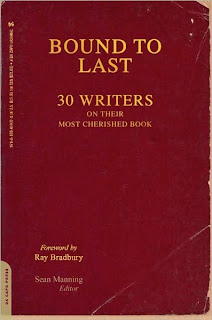 Ulysses
UlyssesThe Summer 2012 Olympics will take place in London. In a competition to select a piece of verse designed to inspire the athletes and serve as a motto for the event, the last lines Tennyson’s Ulysses were chosen.
“To strive, to seek, to find, and not to yield.”
The passage is a ringing call to action, exploration, and persistence. It also has a very personal meaning for me, as it is the passage that my grandmother stitched in a beautiful needlepoint tapestry that has always hung above the fireplace of my home.
Books That Make a Reader
Philip Roth recently spoke before The Center for Fiction about the books that turned his life toward literature. The books were four novels by Thomas Wolfe. He said:
In 1949, when I was sixteen, I stumbled on Thomas Wolfe, who died at thirty-eight in 1938, and who made numerous adolescents aside from me devotees of literature for life. In Wolfe, everything was heroically outside, whether it was the voracious appetite for experience of Eugene Gant, the hero of his first two novels, or of George Webber, the hero of his last two. The hero’s loneliness, his egocentrism, his sprawling consciousness gave rise to a tone of elegiac lyricism that was endlessly sustained by the raw yearning for an epic existence—for an epic American existence. And, in those postwar years, what imaginative young reader didn’t yearn for that?
Theater Chez Schmidt
My Last Play was written and is performed by Ed Schmidt in what The New Yorker calls “his perfectly nice Carroll Gardens flat for an audience of fourteen.” He has been performing his work this way since 2002, when he first started inviting viewers to his home. In My Last Play Schmidt discusses his life “on the margins of the American theatre” and when he concludes he does something quite remarkable. He invites the members of the audience to take one of the theater books from his library of 2,000 volumes.
As Hilton Als says in describing this uncommon form of theater-going, “His iconoclasm must be lonely. Which, of course, the source of any comedy worth its thorns.”
Virginia Woolf
Monday, March 28th was the 70th Anniversary of Virginia Woolf’s death. I’ll never forget the letter, the love letter really, that she wrote to her husband, Leonard, before she left to take her life in the nearby River Ouse.
Dearest,
I feel certain I am going mad again. I feel we can't go through another one of those terrible times. And I shan't recover this time. I begin to hear voices and I can't concentrate. So I am doing what seems the best thing to do. You have given me the greatest possible happiness. You have been in every way all that anyone could be. I don't think two people could have been happier till this terrible disease came. I can't fight any longer. I know that I am spoiling your life, that without me you could work. And you will I know. You see I can't even write this properly. I can't read. What I want to say is I owe all the happiness of my life to you. You have been entirely patient with me and incredibly good. I want to say that – everybody knows it. If anybody could have saved me it would have been you. Everything has gone from me but the certainty of your goodness. I can't go on spoiling your life any longer.
I don't think two people could have been happier than we have been.
V.













